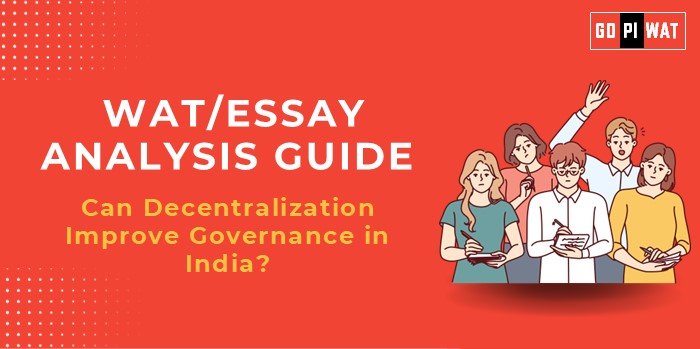🖋️ WAT/Essay Analysis Guide: Can Decentralization Improve Governance in India?
🌟 Understanding Decentralization’s Importance
Decentralization is vital in a vast and diverse nation like India, where governance needs differ across regions. By transferring power to local institutions, decentralization fosters efficient service delivery, greater transparency, and enhanced citizen participation. It aligns with India’s aim to meet sustainable development goals while bridging the gap between government policies and grassroots implementation.
📝 Effective Planning and Writing
- Time Allocation:
- ⏳ Planning: 5 minutes to brainstorm and outline key points.
- ✍️ Writing: 20 minutes to develop a structured and impactful essay.
- 🔍 Review: 5 minutes for refinement and error correction.
- Preparation Tips:
- 📊 Include data-driven insights and examples (e.g., Kerala’s participatory governance model).
- ⚖️ Clearly outline both achievements and challenges.
- 🌍 Refer to successful global models of decentralization like Switzerland or Brazil.
🎯 Introduction Techniques for Essays
- Contrast Approach:
“While India operates as a federal democracy, its heavily centralized governance often fails to address local issues effectively. Decentralization promises to bridge this gap, ensuring decisions are made closer to those they impact.”
- Solution-Based Approach:
“Decentralization is the cornerstone for solving India’s governance challenges, from ensuring better urban management to fostering rural development through empowered local bodies.”
🔍 Structuring the Essay Body
- Achievements:
- ✅ Kerala’s participatory governance has significantly improved efficiency and equity in resource allocation.
- 👩⚖️ Women’s reservation in Panchayati Raj institutions has led to over 1.4 million women in grassroots politics, empowering communities.
- Challenges:
- 💰 Fiscal dependence on state and central governments.
- 📉 Lack of administrative capacity and technical skills at local levels.
- ⚖️ Weak accountability and instances of corruption, which undermine trust.
- Future Outlook:
- 💻 Emphasize integrating technology, such as e-governance platforms, for transparency.
- 📊 Advocate for participatory budgeting to improve accountability and resource allocation.
- 📈 Highlight the need for financial autonomy to enable local governments to address region-specific issues effectively.
💡 Concluding Effectively
- Balanced Approach:
“Decentralization holds immense potential to enhance governance in India. However, for it to succeed, robust accountability frameworks and financial autonomy must accompany the transfer of power.”
- Global Comparison:
“India can draw inspiration from Brazil’s participatory budgeting and Switzerland’s empowered cantonal governance to create a model of decentralization that is both inclusive and effective.”
📊 Recommendations for Sustainable Progress
- 💰 Strengthen Fiscal Autonomy: Increase local bodies’ share of tax revenue and grant flexibility in spending.
- 💻 Leverage Technology: Introduce digital tools for transparent governance and citizen engagement.
- 🎓 Capacity Building: Conduct training programs for local representatives to enhance administrative and financial management skills.
📚 Sample Short Essays
- Balanced Perspective:
“Decentralization can democratize governance in India, addressing diverse regional needs. However, achieving its full potential demands overcoming fiscal constraints and accountability challenges.”
- Solution-Oriented:
“Empowering local governments with financial independence, technological tools, and accountability mechanisms can revolutionize governance in India, bringing it closer to the people.”
- Global Comparison:
“Drawing lessons from Brazil’s participatory budgeting and Switzerland’s decentralized cantons, India can create an inclusive governance model that prioritizes regional equity and efficiency.”


